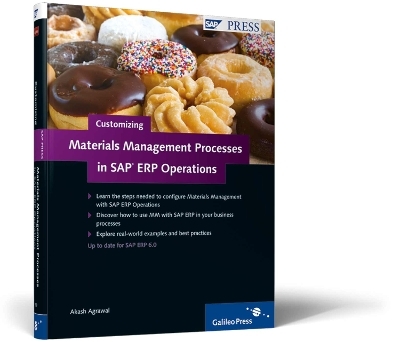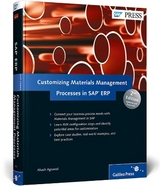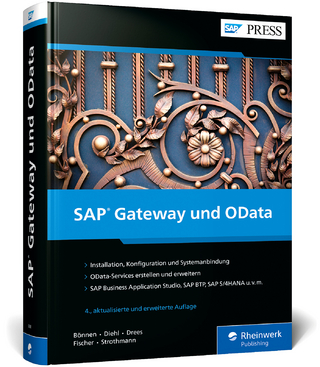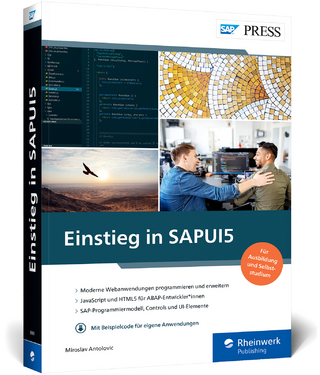
Customizing Materials Management Processes in SAP ERP Operations
SAP Press (Verlag)
978-1-59229-280-6 (ISBN)
- Titel erscheint in neuer Auflage
- Artikel merken
Business Overview Diagrams: Understand the ins and outs of materials management through the practical diagrams included throughout.
Akash Agrawal has more than 15 years of experience in SAP Supply Chain Management in the continuous process chemical, batch process, discrete manufacturing (telecom & media), utilities, and banking and retail industries.He's worked extensively on SAP system support, rollouts, and upgrade and implementation projects and has managed large global SAP projects in both the United States and Europe. His experience includes working with SAP 4.0B, SAP 4.6C, SAP 4.7 Enterprise Edition, SAP ECC 5.0, SAP ECC 6.0, SAP SRM 5.0, SAP IS Utilities, and other SAP ERP products.Akash is a frequent lecturer and visiting faculty member in some of the world's top business schools, and he speaks on the topics of SCM, ERP, and Production & Operations Management.Akash has received many awards such as the best SAP Architect Award from IBM and the best Quality and Delivery Award. He is an engineer and has an MBA from a premier educational institution.
... Who Needs This Book ... 17 ... How to Use This Book ... 17 1 ... Introduction ... 21 ... 1.1 ... Overview of SAP ERP ... 21 ... 1.2 ... Overview of Materials Management ... 24 ... 1.3 ... SAP System Environment: Development, Quality, and Production Clients ... 26 ... ... 1.3.1 ... Client Descriptions ... 29 ... ... 1.3.2 ... Transport Requests ... 30 ... 1.4 ... Summary ... 32 2 ... SAP Organizational Structure ... 33 ... 2.1 ... Introduction to Organizational Structures ... 33 ... ... 2.1.1 ... Levels of an Organizational Structure ... 34 ... ... 2.1.2 ... Business Scenarios and Organizational Structure ... 37 ... 2.2 ... Setting Up Organizational Structures in an SAP System ... 42 ... ... 2.2.1 ... Creating Company Codes ... 42 ... ... 2.2.2 ... Defining Valuation Levels ... 43 ... ... 2.2.3 ... Creating Plants ... 44 ... ... 2.2.4 ... Assigning Plants to Company Codes ... 46 ... ... 2.2.5 ... Creating Storage Locations for Plants ... 46 ... ... 2.2.6 ... Creating Purchasing Organizations ... 47 ... ... 2.2.7 ... Assigning Purchasing Organizations to Company Codes and Plants ... 48 ... ... 2.2.8 ... Assigning Standard Purchasing Organizations to Plants ... 50 ... ... 2.2.9 ... Assigning Purchasing Organizations to Reference Purchase Organizations ... 51 ... ... 2.2.10 ... Creating Purchase Groups ... 52 ... 2.3 ... Summary ... 53 3 ... Master Data ... 55 ... 3.1 ... Vendor Master Records ... 56 ... ... 3.1.1 ... Vendor Account Group ... 57 ... ... 3.1.2 ... Field Selection ... 59 ... ... 3.1.3 ... Number Interval ... 61 ... ... 3.1.4 ... Vendor Status (One-Time Vendor ... 63 ... ... 3.1.5 ... Reconciliation Accounts for Vendor Master Records ... 64 ... ... 3.1.6 ... Partner Schemas ... 65 ... 3.2 ... Material Master Records ... 70 ... ... 3.2.1 ... Main Attributes ... 72 ... ... 3.2.2 ... Configuring a New Material Type ... 74 ... ... 3.2.3 ... Defining a Number Range for a Material Type ... 77 ... ... 3.2.4 ... Defining Field Selections ... 79 ... ... 3.2.5 ... Defining Material Groups ... 80 ... 3.3 ... Purchasing Info Records ... 81 ... ... 3.3.1 ... Structure ... 82 ... ... 3.3.2 ... Creation ... 85 ... ... 3.3.3 ... Configuration ... 86 ... 3.4 ... Source List ... 87 ... ... 3.4.1 ... Structure ... 87 ... ... 3.4.2 ... Creation ... 89 ... ... 3.4.3 ... Configuration ... 89 ... 3.5 ... Quota Arrangement ... 90 ... ... 3.5.1 ... Elements ... 90 ... 3.6 ... Summary ... 93 4 ... Procurement Processes ... 95 ... 4.1 ... Item Category ... 96 ... 4.2 ... Procure to Pay ... 98 ... ... 4.2.1 ... Business Scenario ... 99 ... ... 4.2.2 ... P2P Documents ... 99 ... 4.3 ... Direct Material Procurement ... 105 ... ... 4.3.1 ... Business Scenario ... 105 ... ... 4.3.2 ... Process Steps ... 106 ... ... 4.3.3 ... Configuration Steps ... 107 ... 4.4 ... Indirect Materials Procurement ... 107 ... ... 4.4.1 ... Business Scenario ... 108 ... ... 4.4.2 ... Process Steps ... 110 ... ... 4.4.3 ... Configuration Steps ... 111 ... 4.5 ... Blanket Purchase Orders for Consumable Materials ... 113 ... ... 4.5.1 ... Business Scenario ... 113 ... ... 4.5.2 ... Process Steps ... 114 ... ... 4.5.3 ... Configuration Steps ... 115 ... 4.6 ... Service Procurement ... 116 ... ... 4.6.1 ... Business Scenario ... 116 ... ... 4.6.2 ... Service Master Record ... 117 ... ... 4.6.3 ... Documents and Price Conditions in Service Procurement ... 118 ... ... 4.6.4 ... Process Steps ... 119 ... ... 4.6.5 ... Configuration Steps ... 121 ... 4.7 ... Consignment Procurement ... 126 ... ... 4.7.1 ... Business Scenario ... 126 ... ... 4.7.2 ... Process Steps ... 129 ... ... 4.7.3 ... Configuration Steps ... 132 ... 4.8 ... Subcontract Procurement ... 132 ... ... 4.8.1 ... Business Scenario ... 133 ... ... 4.8.2 ... Process Steps ... 136 ... ... 4.8.3 ... Configuration Steps ... 140 ... 4.9 ... Third-Party Procurement ... 140 ... ... 4.9.1 ... Business Scenario ... 140 ... ... 4.9.2 ... Process Steps ... 141 ... ... 4.9.3 ... Configuration Steps ... 143 ... 4.10 ... Outline Agreements ... 143 ... ... 4.10.1 ... Contract Agreements ... 144 ... ... 4.10.2 ... Scheduling Agreements ... 150 ... 4.11 ... Stock Transfer ... 154 ... ... 4.11.1 ... Business Scenario ... 154 ... ... 4.11.2 ... One Step Stock Transfer ... 155 ... ... 4.11.3 ... Two Step Stock Transfer ... 157 ... ... 4.11.4 ... Stock Transport Orders ... 158 ... ... 4.11.5 ... Stock Transfer from One Company Code Plant to Another Company Code Plant ... 159 ... 4.12 ... Inter-Company Purchases ... 160 ... ... 4.12.1 ... Business Scenario ... 160 ... ... 4.12.2 ... Stock Transport Order with Delivery via Shipping ... 161 ... ... 4.12.3 ... Stock Transport Order with Delivery and Billing Document/Invoice ... 162 ... ... 4.12.4 ... Configuration Steps ... 164 ... 4.13 ... Summary ... 168 5 ... Inventory Management Processes ... 169 ... 5.1 ... Movement Types ... 171 ... 5.2 ... Inbound and Outbound Processes ... 175 ... ... 5.2.1 ... Inbound/Outbound Process Definitions ... 176 ... ... 5.2.2 ... Inventory Management Configurations ... 178 ... 5.3 ... Stock Types in Inventory Management ... 183 ... ... 5.3.1 ... Standard Stock Types ... 183 ... ... 5.3.2 ... Goods Receipt Blocked Stock ... 186 ... ... 5.3.3 ... Special Stock Types ... 188 ... 5.4 ... Physical Inventory Management Processes ... 190 ... ... 5.4.1 ... Process Steps ... 191 ... ... 5.4.2 ... Cycle Counting Method ... 193 ... 5.5 ... Vendor Return Process ... 198 ... ... 5.5.1 ... Return without Return Purchase Order ... 199 ... ... 5.5.2 ... Return with Return Purchase Order ... 200 ... ... 5.5.3 ... Return with Return Purchase Order and Outbound Delivery ... 202 ... 5.6 ... Summary ... 205 6 ... Invoice Verification ... 207 ... 6.1 ... Basics of Invoice Verification ... 209 ... 6.2 ... Purchase Order-Based Invoice Verification ... 212 ... 6.3 ... Goods Receipt-Based Invoice Verification ... 213 ... 6.4 ... Invoices for Account-Assigned Purchase Orders ... 213 ... ... 6.4.1 ... Account Postings ... 214 ... ... 6.4.2 ... Process Steps ... 215 ... 6.5 ... Invoices for Blanket Purchase Orders ... 216 ... 6.6 ... Evaluated Receipt Settlements ... 217 ... ... 6.6.1 ... Business Scenario ... 217 ... ... 6.6.2 ... Prerequisites in Master Data ... 218 ... ... 6.6.3 ... Process Steps ... 220 ... 6.7 ... Invoicing Plans ... 222 ... ... 6.7.1 ... Business Scenario ... 222 ... ... 6.7.2 ... Periodic Invoicing Plan ... 222 ... ... 6.7.3 ... Partial Invoicing Plan ... 223 ... ... 6.7.4 ... Customization ... 224 ... ... 6.7.5 ... Process Steps ... 227 ... 6.8 ... Subsequent Debit/Credit ... 229 ... ... 6.8.1 ... Business Scenario ... 229 ... ... 6.8.2 ... Account Postings ... 229 ... ... 6.8.3 ... Process Steps ... 231 ... 6.9 ... Credit Memos and Reversals ... 232 ... ... 6.9.1 ... Business Scenario ... 232 ... ... 6.9.2 ... Process Steps ... 233 ... 6.10 ... Invoice Verification in Background Processing ... 234 ... ... 6.10.1 ... Business Scenario ... 234 ... ... 6.10.2 ... Process Steps ... 235 ... 6.11 ... Invoice Reductions ... 237 ... ... 6.11.1 ... Business Scenario ... 237 ... ... 6.11.2 ... Account Posting ... 238 ... ... 6.11.3 ... Process Steps ... 238 ... 6.12 ... Invoices with Variances ... 240 ... ... 6.12.1 ... Business Scenario ... 241 ... ... 6.12.2 ... Account Posting ... 241 ... ... 6.12.3 ... Process Steps ... 243 ... ... 6.12.4 ... Configuration Steps ... 243 ... 6.13 ... Taxes in Invoice Verification ... 245 ... ... 6.13.1 ... Entering Tax Data in an Invoice ... 246 ... ... 6.13.2 ... Configuration ... 246 ... 6.14 ... Discounts in Invoice Verification ... 247 ... ... 6.14.1 ... Account Postings ... 248 ... ... 6.14.2 ... Configuration of Gross/Net Posting ... 250 ... ... 6.14.3 ... Configuration of Payment Terms ... 251 ... 6.15 ... Invoice Blocking ... 252 ... ... 6.15.1 ... Business Scenario ... 252 ... ... 6.15.2 ... Quantity Variance ... 254 ... ... 6.15.3 ... Price Variance ... 255 ... ... 6.15.4 ... Stochastic Blocking ... 256 ... ... 6.15.5 ... Manual Blocking ... 258 ... ... 6.15.6 ... Tolerances ... 260 ... ... 6.15.7 ... Releasing Blocked Invoices ... 262 ... 6.16 ... GR/IR Account Maintenance ... 263 ... 6.17 ... Duplicate Invoice Check ... 266 ... 6.18 ... Summary ... 266 7 ... Inventory Valuation ... 269 ... 7.1 ... Valuation Area ... 269 ... 7.2 ... Valuation Methods: Moving Average Price and Standard Price ... 271 ... ... 7.2.1 ... Moving Average Price V ... 272 ... ... 7.2.2 ... Standard Price S ... 273 ... ... 7.2.3 ... Configuration Steps ... 274 ... ... 7.2.4 ... Process Steps ... 276 ... 7.3 ... Material Price Changes ... 277 ... ... 7.3.1 ... Business Scenario ... 277 ... ... 7.3.2 ... Process Steps ... 281 ... ... 7.3.3 ... Configuration Steps for Price Changes in the Previous Period/Year ... 282 ... 7.4 ... Split Valuation ... 283 ... ... 7.4.1 ... Business Scenario ... 283 ... ... 7.4.2 ... Configuration Steps ... 285 ... ... 7.4.3 ... Process Steps ... 289 ... 7.5 ... Summary ... 292 8 ... Key Configurations in SAP Materials Management ... 293 ... 8.1 ... Release Strategy ... 293 ... ... 8.1.1 ... Business Scenario ... 294 ... ... 8.1.2 ... Basic Concepts of Release Strategy ... 295 ... ... 8.1.3 ... Configuration Steps for Release Procedure without Classification ... 297 ... ... 8.1.4 ... Configuration Steps for the Release Procedure with Classification ... 302 ... ... 8.1.5 ... Process Steps ... 310 ... 8.2 ... Pricing Procedure ... 311 ... ... 8.2.1 ... Business Scenario ... 312 ... ... 8.2.2 ... Process Steps ... 312 ... ... 8.2.3 ... Configuration Steps ... 314 ... 8.3 ... Automatic Account Determination ... 323 ... ... 8.3.1 ... Business Scenario ... 323 ... ... 8.3.2 ... Configuration with the Automatic Account Determination Wizard ... 325 ... ... 8.3.3 ... Configuration without the Automatic Account Determination Wizard ... 325 ... ... 8.3.4 ... Process Steps ... 332 ... 8.4 ... Document Type ... 336 ... ... 8.4.1 ... Business Scenario ... 336 ... ... 8.4.2 ... Configuration Steps ... 337 ... ... 8.4.3 ... Process Steps ... 340 ... 8.5 ... Version Management ... 340 ... ... 8.5.1 ... Business Scenario ... 340 ... ... 8.5.2 ... Configuration Steps ... 341 ... ... 8.5.3 ... Process Steps ... 345 ... 8.6 ... Message Determination ... 346 ... ... 8.6.1 ... Business Scenario ... 347 ... ... 8.6.2 ... How Message Determination Works ... 348 ... ... 8.6.3 ... Configuration Steps ... 349 ... ... 8.6.4 ... Process Steps ... 355 ... 8.7 ... Summary ... 356 9 ... Material Classification ... 357 ... 9.1 ... Introduction to Material Classification ... 357 ... 9.2 ... Key Terms of the Classification System ... 360 ... 9.3 ... Configuration Steps ... 361 ... ... 9.3.1 ... Step 1: Define Characteristics ... 362 ... ... 9.3.2 ... Step 2: Define Class ... 364 ... ... 9.3.3 ... Step 3: Assign Objects to Classes ... 366 ... 9.4 ... Summary ... 367 10 ... Conclusion ... 369 A ... The Author ... 375 B ... List of Important Transaction Codes ... 377 ... B.1 ... Material Master & Service Master ... 377 ... B.2 ... Vendor Master ... 377 ... B.3 ... Other Master Records ... 378 ... B.4 ... Inventory Management ... 378 ... B.5 ... Physical Inventory ... 379 ... B.6 ... Purchasing & Invoicing Transactions ... 379 ... B.7 ... Configuration ... 381 C ... List of Important Tables ... 383 ... C.1 ... Material Master Tables ... 383 ... C.2 ... Other Important Tables ... 383
| Erscheint lt. Verlag | 30.1.2010 |
|---|---|
| Reihe/Serie | SAP Press |
| Verlagsort | Maryland |
| Sprache | englisch |
| Maße | 175 x 229 mm |
| Einbandart | gebunden |
| Themenwelt | Mathematik / Informatik ► Informatik ► Netzwerke |
| Informatik ► Weitere Themen ► SAP | |
| ISBN-10 | 1-59229-280-1 / 1592292801 |
| ISBN-13 | 978-1-59229-280-6 / 9781592292806 |
| Zustand | Neuware |
| Informationen gemäß Produktsicherheitsverordnung (GPSR) | |
| Haben Sie eine Frage zum Produkt? |
aus dem Bereich



